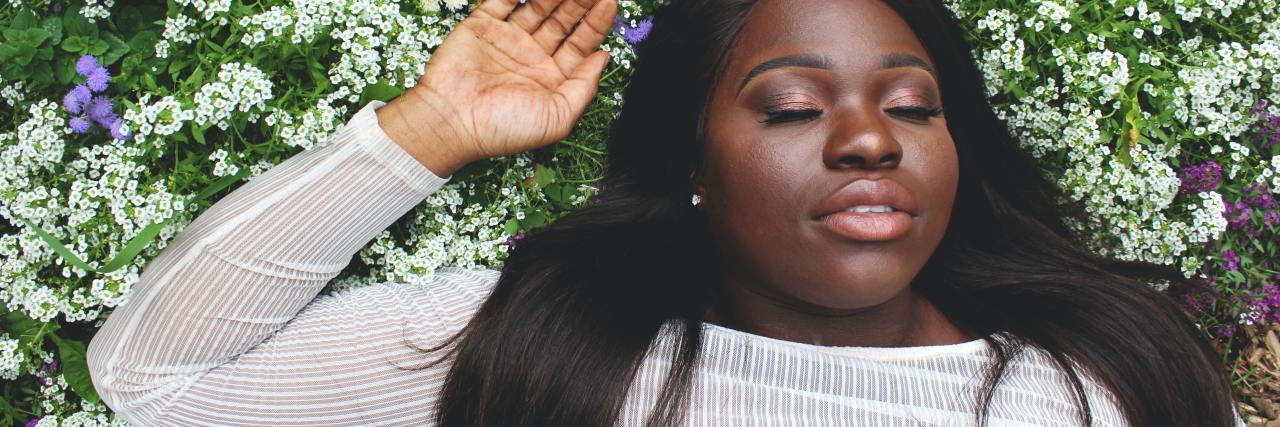This Assumption About Eating Disorders Is Harming Black Girls and Women
Editor's Note
If you live with an eating disorder, the following post could be potentially triggering. You can contact the Crisis Text Line by texting “NEDA” to 741741.
When I was 14 years old, a freshman in high school, I went to see my pediatrician for my annual visit. At the end of the appointment, my doctor took me out into the hallway and weighed me. He said, “wow, you are eating too much, you need to cut back on your eating. You are fat.” I was devastated. He said all of this in a hallway full of people and my mom. My mom was already super conscientious of my weight “problems.”
I was so embarrassed. I decided to never be put into that situation again. I did not have an option to just stop seeing him. I did not have that kind of control over my own care.
I came up with a plan. I would stop eating. This would satisfy everyone. I would just restrict and this would make me thin enough to be acceptable.
My plan was to only buy a cookie and a juice in the school cafeteria for lunch and pocket the rest of the money.
No one noticed I was not eating until, one day, I passed out on the stairs at school.
My dad took me back to the same doctor. He grilled me and asked if I was eating. I told him no, that he wanted me to lose weight and I was trying. In that moment, he took no responsibility. He just turned to my dad and said, “you need to make sure she is eating.”
That was it. No, “what is wrong? How can we help you? Here are some resources.” No statements that this is a serious problem and should be evaluated. I was displaying signs of anorexia nervosa and he never questioned me or considered the condition pertinent to me. He just said, “you need to stop fooling around and eat.”
When you close your eyes and you think what the typical anorexic person is like, you likely think white, female, thin and middle or upper class. You do not think Black, female, middle class and in a larger body.
This assumption is harming Black girls and women. We are more likely to have disordered eating than white women and girls, but we are less diagnosed and more dismissed when we do not fit the common stereotype. And when we are identified, we are often told we are stronger than this, and to set an example for others and heal yourself.
No one told me I was OK in my body just the way I was. No one stated anything about body positivity or body neutrality. The messages I was getting from family and society was that I was not good enough the way I was and that I needed to change, or I was going to suffer my entire life. My mom promised me no boy would want me — it turns out I am a lesbian, so there is that. She told me I would be seen as lazy and that I would never be successful in a career — I have run multimillion-dollar statewide nonprofits, so there, Mom. I believed her and tried to act accordingly, and when that was not working, I tried harder even to the point of starving myself. Then, I was punished for that.
I have dieted for nearly 45 years, and I am super fat. My society sanctioned restriction and food rules following did nothing but produce disordered eating.
The eating disorder community and professionals do not see Black girls and women as fitting neatly into any of their categories of disorder. We are an afterthought, and this leaves Black girls and women highly vulnerable to diet culture and the other pressures that lead to disordered eating.
I felt my worth was tied up in my size. I never imagined I could have an eating disorder; that was for white girls. This thinking has led to years of struggle and invisibility. I do not want that for me anymore. It has taken me to my 49th year on this Earth to come to learn that my Black body is not here to entertain or give you something pleasing to look at. I am a strong, bright, talented woman and have so much to offer those I meet and love. My size is not a determinant of my value and worth. This will be hard for some to swallow — that I would dare to be proud of myself at this size — but I am most of the time (though I’m still dealing with old messaging).
I want every Black woman and girl to recognize her worth regardless of the prevailing messages, and if you are struggling with your eating and body image, there are practitioners out there that are open to serving you in culturally centered care, that will affirm you and help you heal your relationship with food and body image (and not make you eat cauliflower and dried chicken breast). You deserve more than what society is dishing out and I have your back.
Stay Mighty Strong!
Photo by Clarke Sanders on Unsplash

